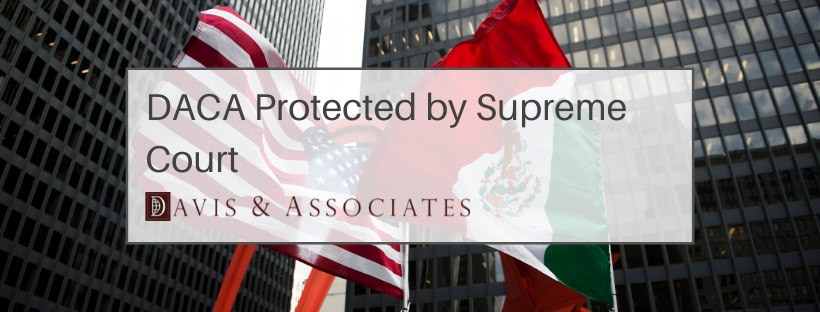
A Lifeline to Dreamers: Supreme Court Extends DACA Protections
The US Supreme Court, in a 5-4 decision, extended a reprieve to recipients of benefits under the Deferred Action for Childhood Arrivals program (DACA). Although they did not find President Trump’s political decision to end the program outside the bounds of his power as President, or to make it permanent for those who have it, the Court did find that the way it was done and the timing violated the law. The Administrative Procedures Act prohibits government agencies from imposing arbitrary and capricious polices, rules and regulations. The Supreme Court found that the timing and the method of ended the DACA program violated that legal requirement. They remanded the case back to the Department of Homeland Security to give it the proper review ending such a program deserves.
The DACA program itself was a political creation by President Obama. The timing of its implementation is telling. President Obama ran his first campaign in part on his concern for immigrants and their families. Those of us in the business expected a kinder, more open and inclusive attitude and policy towards immigration generally from him. To our surprise, first term he was more enforcement heavy than President Bush the second. In fact, he holds the record for deportations, by a significant margin over his predecessors. Summer of 2012, his campaign advisers must have become aware that he would lose a significant number of votes – enough to potentially lose reelection – if he didn’t throw a peace offering to those who vote in part on a positive immigration policy.
In June 2012, just months before the election, he used his executive authority to create DACA. There is no question this was a policy put in place, at least in part, so that President Obama could rebuild trust from immigration supportive voters. To be clear, though, he didn’t create it out of nothing. He absolutely did it within his authority as executive in chief.
Deferred Action as a concept has been part of immigration law and policy in the US for years. The President, and those who work for the executive branch of the government, can exercise this authority when they deem it appropriate. Even before DACA, we have always been able to reach out to the authorities at US Citizenship and Immigration Services (USCIS) and Immigration and Customs Enforcement (ICE) to request deferred action when we felt the conditions warranted such consideration. Generally we would ask when life threatening humanitarian or family factors were compelling. Deferred Action allows for work authorization for the recipient and for protection from deportation. One way it is still used commonly today is to protect the parents of US military servicemen and servicewomen from deportation, so that stress and concern is off the minds of those who serve. They can request Deferred Action and employment authorization from USCIS.
DACA was a recognition that people brought to the US at a young age should not be held responsible and punished by our immigration laws for something they had no role in choosing. To qualify, a person had to have entered the US before age 16, and resided continuously in the US since June 15, 2007 – 5 years prior to the announcement of the program. The person must also have been physically in the US on the day the program was announced and also on the day of filing the application. The person must have been under age 31 as of June 15, 2012, no significant criminal record, and enrolled in school, graduated from high school or received a high school graduation equivalent (such as a GED certificate), or some qualifying US military service.
It was a great program that helped many people realize their goals of being able to go to college, start families with the ability to provide for them, and stop living in constant fear and worry about ICE coming and deporting them any time. Personally, it helped a lot of people that I care about find some peace of mind, and for that I was personally grateful for the program.
President Trump came into office in part on a platform of hard core immigration enforcement. I believe enforcement of our laws is important. However, because we’re talking about people, families and their lives, it has to be done with some consideration of those humanitarian factors that are an inherent part of immigration policy. His choice to end the DACA program, without any consideration of the impact on the people who had the courage to avail themselves of the program, was distasteful and ruthless.
For my part, I’m glad to see the US Supreme Court cross over political leanings to force USDHS and President Trump to reconsider how it handled the end of the program. I also hope that as they are going through that reconsideration process, they reflect on the impact a decision to just end the program, without a phase out period or a continuance solely for those who applied, is not how we should be presenting ourselves to those who have sought refuge inside our borders and as a the world leader in humanitarian ideals we should be.
About Davis & Associates:
Davis & Associates is the immigration law firm of choice in Houston & North Texas including Dallas, Fort Worth, Plano, Frisco, McKinney and surrounding areas. Their attorneys provide expert legal counsel for all aspects of immigration law, including deportation defense, writs of habeas corpus and mandamus, family-sponsored immigration, employment-sponsored immigration, investment immigration, employer compliance, temporary visas for work and college, permanent residence, naturalization, consular visa processing, waivers, and appeals. Attorney Garry L. Davis is Board Certified in Immigration and Nationality Law by the Texas Board of Legal Specialization.
Dallas Contact Info:
Address: 17750 Preston Road Dallas, TX 75252
Phone: (469)957-0508
Houston Contact Info: Address: 6220 Westpark Dr, Suite 110, Houston, TX 77057
Phone: (832) 742-0066
